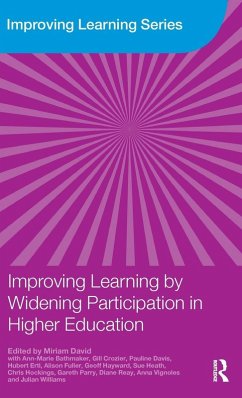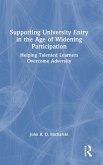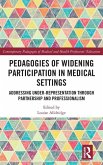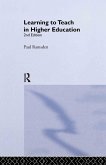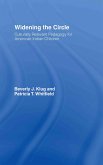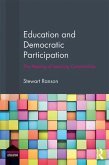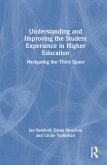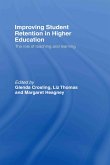Improving Learning by Widening Participation in Higher Education
Herausgeber: David, Miriam; Crozier, Gill; Bathmaker, Ann-Marie
Improving Learning by Widening Participation in Higher Education
Herausgeber: David, Miriam; Crozier, Gill; Bathmaker, Ann-Marie
- Gebundenes Buch
- Merkliste
- Auf die Merkliste
- Bewerten Bewerten
- Teilen
- Produkt teilen
- Produkterinnerung
- Produkterinnerung
This book presents a strong and coherent rationale for improving learning for diverse students from a range of backgrounds within higher education.
Andere Kunden interessierten sich auch für
![Supporting University Entry in the Age of Widening Participation Supporting University Entry in the Age of Widening Participation]() John R. D. BlicharskiSupporting University Entry in the Age of Widening Participation167,99 €
John R. D. BlicharskiSupporting University Entry in the Age of Widening Participation167,99 €![Pedagogies of Widening Participation in Medical Settings Pedagogies of Widening Participation in Medical Settings]() Pedagogies of Widening Participation in Medical Settings171,99 €
Pedagogies of Widening Participation in Medical Settings171,99 €![Learning to Teach in Higher Education Learning to Teach in Higher Education]() Paul RamsdenLearning to Teach in Higher Education221,99 €
Paul RamsdenLearning to Teach in Higher Education221,99 €![Widening the Circle Widening the Circle]() Beverly J. KlugWidening the Circle209,99 €
Beverly J. KlugWidening the Circle209,99 €![Education and Democratic Participation Education and Democratic Participation]() Stewart RansonEducation and Democratic Participation167,99 €
Stewart RansonEducation and Democratic Participation167,99 €![Understanding and Improving the Student Experience in Higher Education Understanding and Improving the Student Experience in Higher Education]() Jan BamfordUnderstanding and Improving the Student Experience in Higher Education167,99 €
Jan BamfordUnderstanding and Improving the Student Experience in Higher Education167,99 €![Improving Student Retention in Higher Education Improving Student Retention in Higher Education]() Glenda CroslingImproving Student Retention in Higher Education187,99 €
Glenda CroslingImproving Student Retention in Higher Education187,99 €-
-
-
This book presents a strong and coherent rationale for improving learning for diverse students from a range of backgrounds within higher education.
Produktdetails
- Produktdetails
- Verlag: Routledge
- Seitenzahl: 282
- Erscheinungstermin: 21. September 2009
- Englisch
- Abmessung: 222mm x 145mm x 19mm
- Gewicht: 489g
- ISBN-13: 9780415495417
- ISBN-10: 0415495415
- Artikelnr.: 28518375
- Herstellerkennzeichnung
- Libri GmbH
- Europaallee 1
- 36244 Bad Hersfeld
- gpsr@libri.de
- Verlag: Routledge
- Seitenzahl: 282
- Erscheinungstermin: 21. September 2009
- Englisch
- Abmessung: 222mm x 145mm x 19mm
- Gewicht: 489g
- ISBN-13: 9780415495417
- ISBN-10: 0415495415
- Artikelnr.: 28518375
- Herstellerkennzeichnung
- Libri GmbH
- Europaallee 1
- 36244 Bad Hersfeld
- gpsr@libri.de
Miriam David is Professor of Sociology of Education and Associate Director (Higher Education) of the ESRC's Teaching and Learning Research Programme at the Institute of Education, University of London.
@contents: Selected Contents: Series Preface by Andrew Pollard Part 1 -
What are the issues? CHAPTER 1: Miriam David Introduction to the dilemmas
of Widening Participation in Higher Education Part 2: What does the
research tell us? CHAPTER 2: Gareth Parry Policy contexts: Differentiation,
competition and policies for widening participation CHAPTER 3: Access,
participation and diversity questions in relation to different forms of
post-compulsory further and higher education (FHEs) arranged in 4 sections:
Section 1. Anna Vignoles and Claire Crawford: The importance of prior
educational experiences Section 2. Gill Crozier, Diane Reay and John
Clayton: The Socio-Cultural and Learning Experiences of Working Class
Students in Higher Education Section 3. Hubert Ertl, Geoff Hayward, Michael
Hoelscher: Learners' transition from Vocational Education and Training to
Higher Education Section 4 Ann-Marie Bathmaker: Seamlessness or separation:
negotiating further and higher education boundaries in dual sector
institutions CHAPTER 4: Pedagogies for social diversity and difference
(arranged in two sections) Section 1. Chris Hockings, Sandra Cooke and
Marion Bowl: Learning and teaching in two universities within the context
of increasing student diversity - complexity, contradictions and challenges
Section 2. Julian Williams, Laura Black, Pauline Davis, Paul
Hernandez-Martinez, Graeme Hutcheson, Sue Nicholson, Maria Pampaka and
Geoff Wake: Keeping open the door to mathematically-demanding programmes in
further and higher education: a cultural model of value CHAPTER 5: Outcomes
in terms of age-based participation (arranged in two sections) Section 1:
Anna Vignoles and Nattavudh Powdthavee: Diversity of experiences in higher
education Section 2: Alison Fuller and Sue Heath: Educational
decision-making, social networks and the new widening participation Part 3:
What are the overall implications both for policy and for research?
CHAPTER 6: Miriam David (with contributions from Geoff Hayward and Hubert
Ertl, section 3): Conclusions: What are the overall findings and
implications for evidence-based policies on fair access and widening
participation? CHAPTER 7: Miriam David (with contributions from Gill
Crozier, Geoff Hayward and Hubert Ertl, Julian Williams and colleagues, and
Chris Hockings): How do we improve learning by widening participation in
HE: institutional practices and pedagogies for social diversity? APPENDICES
ON METHODOLOGIES 1. Gareth Parry 2. Anna Vignoles 3. Gill Crozier 4. Geoff
Hayward 5. Julian Williams 6. Chris Hockings 7. Alison Fuller
What are the issues? CHAPTER 1: Miriam David Introduction to the dilemmas
of Widening Participation in Higher Education Part 2: What does the
research tell us? CHAPTER 2: Gareth Parry Policy contexts: Differentiation,
competition and policies for widening participation CHAPTER 3: Access,
participation and diversity questions in relation to different forms of
post-compulsory further and higher education (FHEs) arranged in 4 sections:
Section 1. Anna Vignoles and Claire Crawford: The importance of prior
educational experiences Section 2. Gill Crozier, Diane Reay and John
Clayton: The Socio-Cultural and Learning Experiences of Working Class
Students in Higher Education Section 3. Hubert Ertl, Geoff Hayward, Michael
Hoelscher: Learners' transition from Vocational Education and Training to
Higher Education Section 4 Ann-Marie Bathmaker: Seamlessness or separation:
negotiating further and higher education boundaries in dual sector
institutions CHAPTER 4: Pedagogies for social diversity and difference
(arranged in two sections) Section 1. Chris Hockings, Sandra Cooke and
Marion Bowl: Learning and teaching in two universities within the context
of increasing student diversity - complexity, contradictions and challenges
Section 2. Julian Williams, Laura Black, Pauline Davis, Paul
Hernandez-Martinez, Graeme Hutcheson, Sue Nicholson, Maria Pampaka and
Geoff Wake: Keeping open the door to mathematically-demanding programmes in
further and higher education: a cultural model of value CHAPTER 5: Outcomes
in terms of age-based participation (arranged in two sections) Section 1:
Anna Vignoles and Nattavudh Powdthavee: Diversity of experiences in higher
education Section 2: Alison Fuller and Sue Heath: Educational
decision-making, social networks and the new widening participation Part 3:
What are the overall implications both for policy and for research?
CHAPTER 6: Miriam David (with contributions from Geoff Hayward and Hubert
Ertl, section 3): Conclusions: What are the overall findings and
implications for evidence-based policies on fair access and widening
participation? CHAPTER 7: Miriam David (with contributions from Gill
Crozier, Geoff Hayward and Hubert Ertl, Julian Williams and colleagues, and
Chris Hockings): How do we improve learning by widening participation in
HE: institutional practices and pedagogies for social diversity? APPENDICES
ON METHODOLOGIES 1. Gareth Parry 2. Anna Vignoles 3. Gill Crozier 4. Geoff
Hayward 5. Julian Williams 6. Chris Hockings 7. Alison Fuller
@contents: Selected Contents: Series Preface by Andrew Pollard Part 1 -
What are the issues? CHAPTER 1: Miriam David Introduction to the dilemmas
of Widening Participation in Higher Education Part 2: What does the
research tell us? CHAPTER 2: Gareth Parry Policy contexts: Differentiation,
competition and policies for widening participation CHAPTER 3: Access,
participation and diversity questions in relation to different forms of
post-compulsory further and higher education (FHEs) arranged in 4 sections:
Section 1. Anna Vignoles and Claire Crawford: The importance of prior
educational experiences Section 2. Gill Crozier, Diane Reay and John
Clayton: The Socio-Cultural and Learning Experiences of Working Class
Students in Higher Education Section 3. Hubert Ertl, Geoff Hayward, Michael
Hoelscher: Learners' transition from Vocational Education and Training to
Higher Education Section 4 Ann-Marie Bathmaker: Seamlessness or separation:
negotiating further and higher education boundaries in dual sector
institutions CHAPTER 4: Pedagogies for social diversity and difference
(arranged in two sections) Section 1. Chris Hockings, Sandra Cooke and
Marion Bowl: Learning and teaching in two universities within the context
of increasing student diversity - complexity, contradictions and challenges
Section 2. Julian Williams, Laura Black, Pauline Davis, Paul
Hernandez-Martinez, Graeme Hutcheson, Sue Nicholson, Maria Pampaka and
Geoff Wake: Keeping open the door to mathematically-demanding programmes in
further and higher education: a cultural model of value CHAPTER 5: Outcomes
in terms of age-based participation (arranged in two sections) Section 1:
Anna Vignoles and Nattavudh Powdthavee: Diversity of experiences in higher
education Section 2: Alison Fuller and Sue Heath: Educational
decision-making, social networks and the new widening participation Part 3:
What are the overall implications both for policy and for research?
CHAPTER 6: Miriam David (with contributions from Geoff Hayward and Hubert
Ertl, section 3): Conclusions: What are the overall findings and
implications for evidence-based policies on fair access and widening
participation? CHAPTER 7: Miriam David (with contributions from Gill
Crozier, Geoff Hayward and Hubert Ertl, Julian Williams and colleagues, and
Chris Hockings): How do we improve learning by widening participation in
HE: institutional practices and pedagogies for social diversity? APPENDICES
ON METHODOLOGIES 1. Gareth Parry 2. Anna Vignoles 3. Gill Crozier 4. Geoff
Hayward 5. Julian Williams 6. Chris Hockings 7. Alison Fuller
What are the issues? CHAPTER 1: Miriam David Introduction to the dilemmas
of Widening Participation in Higher Education Part 2: What does the
research tell us? CHAPTER 2: Gareth Parry Policy contexts: Differentiation,
competition and policies for widening participation CHAPTER 3: Access,
participation and diversity questions in relation to different forms of
post-compulsory further and higher education (FHEs) arranged in 4 sections:
Section 1. Anna Vignoles and Claire Crawford: The importance of prior
educational experiences Section 2. Gill Crozier, Diane Reay and John
Clayton: The Socio-Cultural and Learning Experiences of Working Class
Students in Higher Education Section 3. Hubert Ertl, Geoff Hayward, Michael
Hoelscher: Learners' transition from Vocational Education and Training to
Higher Education Section 4 Ann-Marie Bathmaker: Seamlessness or separation:
negotiating further and higher education boundaries in dual sector
institutions CHAPTER 4: Pedagogies for social diversity and difference
(arranged in two sections) Section 1. Chris Hockings, Sandra Cooke and
Marion Bowl: Learning and teaching in two universities within the context
of increasing student diversity - complexity, contradictions and challenges
Section 2. Julian Williams, Laura Black, Pauline Davis, Paul
Hernandez-Martinez, Graeme Hutcheson, Sue Nicholson, Maria Pampaka and
Geoff Wake: Keeping open the door to mathematically-demanding programmes in
further and higher education: a cultural model of value CHAPTER 5: Outcomes
in terms of age-based participation (arranged in two sections) Section 1:
Anna Vignoles and Nattavudh Powdthavee: Diversity of experiences in higher
education Section 2: Alison Fuller and Sue Heath: Educational
decision-making, social networks and the new widening participation Part 3:
What are the overall implications both for policy and for research?
CHAPTER 6: Miriam David (with contributions from Geoff Hayward and Hubert
Ertl, section 3): Conclusions: What are the overall findings and
implications for evidence-based policies on fair access and widening
participation? CHAPTER 7: Miriam David (with contributions from Gill
Crozier, Geoff Hayward and Hubert Ertl, Julian Williams and colleagues, and
Chris Hockings): How do we improve learning by widening participation in
HE: institutional practices and pedagogies for social diversity? APPENDICES
ON METHODOLOGIES 1. Gareth Parry 2. Anna Vignoles 3. Gill Crozier 4. Geoff
Hayward 5. Julian Williams 6. Chris Hockings 7. Alison Fuller

